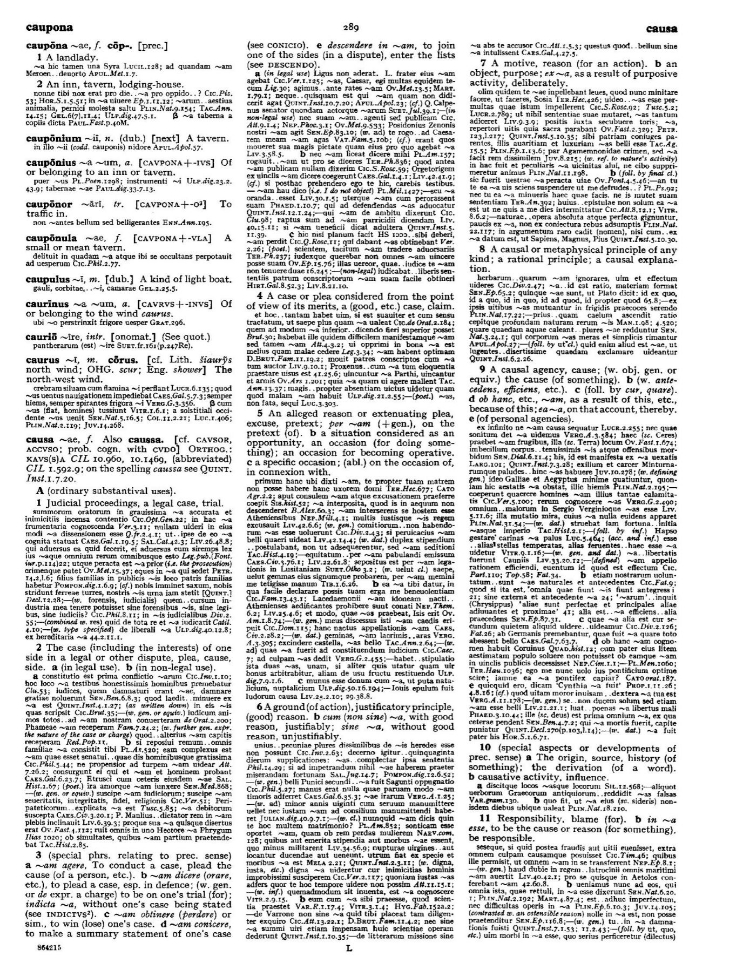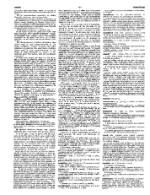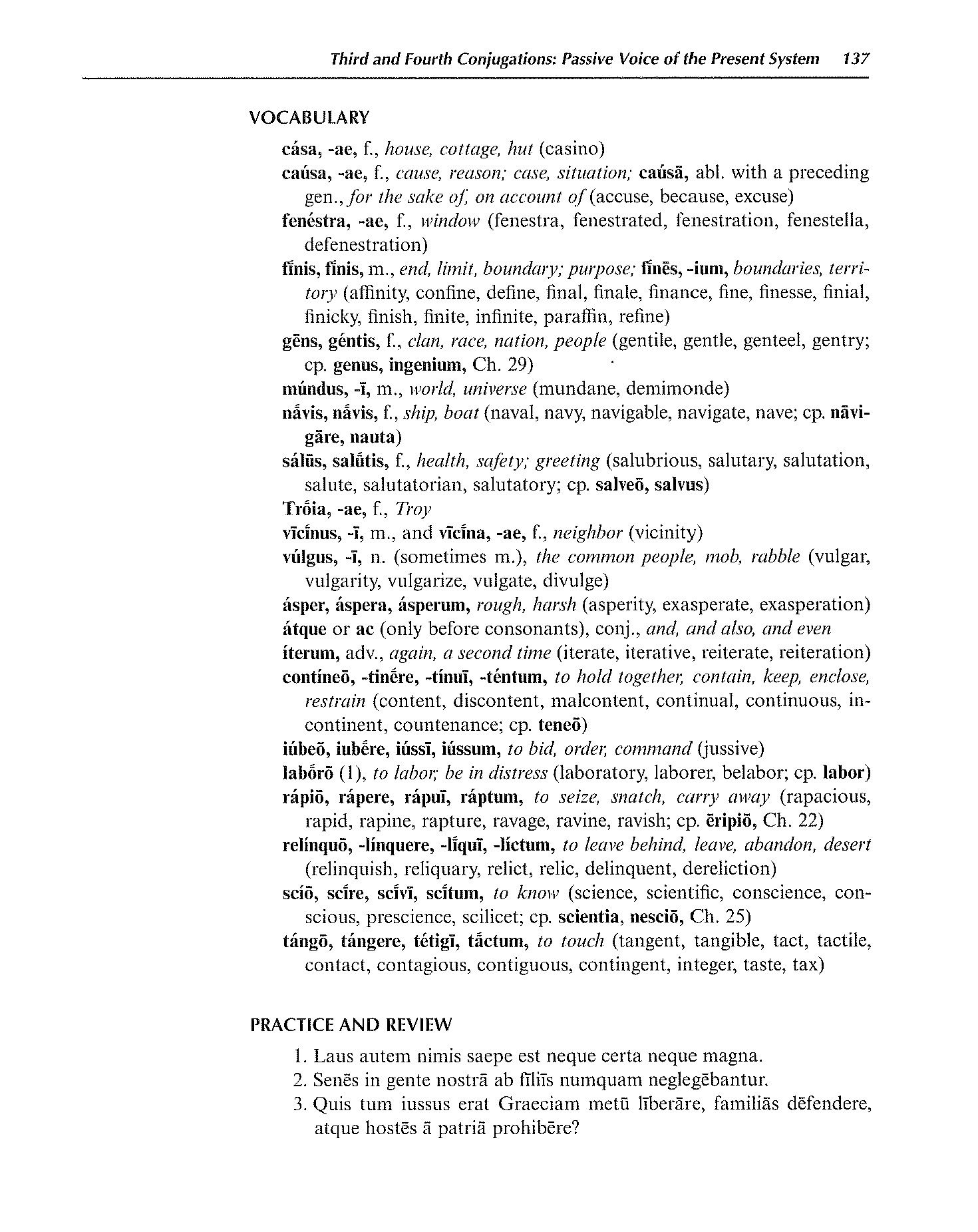
page_listing.tpl
page_subListingDetails.tpl
sub_listingDetails_style1.tpl
sub_listingDetails.title.tpl
causa for the sake
causa is a Latin Noun that primarily means for the sake.
Definitions for causa
Wheelock's Latin
Noun
- 1
cause, reason, case, situation
- 2
causā, abl. with a preceding gen., for the sake of, on account of
English derivatives:
accuse because excuse
Oxford Latin Dictionary
Noun
- 1
(ordinary substantival uses). (1) Judicial proceedings, a legal case, trial.
- 2
The case (including the interests) of one side in a legal or other dispute, plea, cause, side. (a) (in legal use). (b) (in non-legal use).
- 3
(special phrs. relating to prec. sense) (a) ~am agere, To conduct a case, plead the cause (of a person, etc,). (b0) ~am dicere (orare, etc.), to plead a case, esp. in defence; (w. gen. or de expr. a charge) to be on one's trial (for); indicta ~a, without one's case being stated (see INDICTVS2). (C) ~am obtinere (perdere) or sim., to win (lose) one's case. (d) ~am conicere, to make a summary statement of one's case (see CONICIO). (e) descendere in ~am, to join one of the sides (in a dispute), enter the lists (see DESCENDO).
Sentences with causa
Latin to English
Cīvitātis causā eum rapī iussērunt.Compare For the sake of the state they ordered him to be seized.
Lībertātis causā cīvitās nostra ab alterō virō gerī dēbet.Compare For the sake of liberty our state ought to be managed by the other man.
Patriae causā haec difficillima faciāmus.Compare Let us do these very difficult things for the sake of our country.
Discendī causā ad lūdum tuum vēnērunt.Compare They came to your school to learn (for the sake of learning).
Et docēre et rērum exquīrere causās.Compare Both to teach and to seek out the causes of things.
Nēmō iūdex in causa sua.Compare No one should be a judge in their own cause.
Declension table for causa
Cactus2000
| Singular | Plural | |
| Nom. | causa | causae |
| Gen. | causae | causārum |
| Dat. | causae | causīs |
| Acc. | causam | causās |
| Abl. | causā | causīs |
Data sources
Notes
- Definitions
- Frederick M. Wheelock, Wheelock's Latin, 6th ed., rev. Richard A. LaFleur (New York, NY: HarperCollins Publishers, 2005): 137.
- P. G. W. Glare, Oxford Latin Dictionary, Vols. 1-8 (Oxford: Clarendon Press, 1982): 289.
- Word frequencies
- Christopher Francese, "Latin Core Vocabulary," Dickinson College Commentaries, last modified 2014, http://dcc.dickinson.edu.
- Paul B. Diederich, The Frequency of Latin Words and Their Endings, PhD diss., (Columbia University, 1939).
- Louis Delatte, Suzanne Govaerts, Joseph Denooz, and Etienne Evrard, Dictionnaire fréquentiel et index inverse de la langue latine [Frequency Dictionary and Inverse Index of the Latin Language] (Liège, Belgium: Laboratoire d'analyse statistique des langues anciennes de l'Université de Liège [L.A.S.L.A.], 1981): 119.
Bibliography
Allen, Joseph H. Allen and Greenough's New Latin Grammar for Schools and Colleges: Founded on Comparative Grammar. Edited by James B. Greenough, George L. Kittredge, Albert A. Howard, and Benjamin L. D'Ooge. Boston, MA: Ginn & Company, 1903.
Crystal, David. A Dictionary of Linguistics and Phonetics. 6th ed. Oxford, UK: Blackwell Publishing, 2008.
Delatte, Louis, Suzanne Govaerts, Joseph Denooz, and Etienne Evrard. Dictionnaire fréquentiel et index inverse de la langue latine [Frequency Dictionary and Inverse Index of the Latin Language]. Liège, Belgium: Laboratoire d'analyse statistique des langues anciennes de l'Université de Liège (L.A.S.L.A.), 1981.
Diederich, Paul B. The Frequency of Latin Words and Their Endings. PhD diss., Columbia University, 1939.
Francese, Christopher. "Latin Core Vocabulary." Dickinson College Commentaries. Last modified 2014. http://dcc.dickinson.edu/latin-vocabulary-list.
Gildersleeve, Basil L., and Gonzales Lodge. Gildersleeve's Latin Grammar: Third Edition, Revised, and Enlarged. 3rd ed. London, England: Macmillan and Co., 1903.
Glare, Peter G.W. Oxford Latin Dictionary. Vols. 1-8. Oxford, England: Clarendon Press, 1982.
Krüger, Bernd. "Latin Conjugation Tables." Cactus2000. Accessed May 5, 2023. https://latin.cactus2000.de/index.en.php.
Pierson, Nick. "Sound of Text." Accessed October 26, 2019. https://soundoftext.com.
Wheelock, Frederick M. Wheelock's Latin. 6th ed. Revised by Richard A. LaFleur. New York, NY: HarperCollins Publishers, 2005.
Wiktionary Contributors. "Victionarium." Wikimedia Foundation, Inc. Updated March 18, 2019. https://la.wiktionary.org/wiki/Victionarium:Pagina_prima.
Citation
Chicago (17th ed.)
Allo Contributors. "causa, causae (n.) - Latin Word Definition." Allo Latin Dictionary. Last modified . Accessed February 20, 2026. http://ancientlanguages.org/latin/dictionary/causa-causae.
Entry created on . Last updated on .








